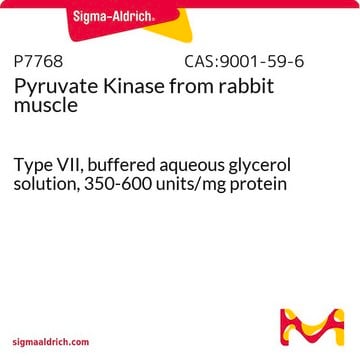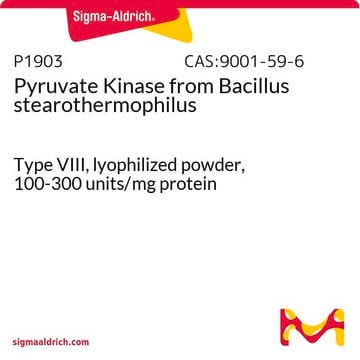10108294001
Roche
Phosphoenol-pyruvate
97% (PEP-K), pkg of 1 g
Synonym(s):
Phospho(enol)pyruvic acid monopotassium salt, 2-(Phosphonooxy)-2-propenoic acid monopotassium salt, mono-Potassium phosphoenolpyruvate, PEP-K
About This Item
Recommended Products
description
C3H4O6PK (Formula)
PEP, monopotassium salt
Quality Level
Assay
97% (PEP-K)
form
solid
mol wt
Mr 168.0 (PEP)
Mr 206.1 (PEP-K)
packaging
pkg of 1 g
manufacturer/tradename
Roche
storage temp.
2-8°C
SMILES string
[K+].OC(=O)C(=C)OP(O)([O-])=O
InChI
1S/C3H5O6P.K/c1-2(3(4)5)9-10(6,7)8;/h1H2,(H,4,5)(H2,6,7,8);/q;+1/p-1
InChI key
SOSDSEAIODNVPX-UHFFFAOYSA-M
Looking for similar products? Visit Product Comparison Guide
Related Categories
General description
Application
- glutamate-cysteine ligase activity
- v-ATPase enzyme activity assay
- meso kinase assay
Biochem/physiol Actions
Other Notes
Storage Class Code
11 - Combustible Solids
WGK
WGK 1
Flash Point(F)
Not applicable
Flash Point(C)
Not applicable
Choose from one of the most recent versions:
Already Own This Product?
Find documentation for the products that you have recently purchased in the Document Library.
Customers Also Viewed
Our team of scientists has experience in all areas of research including Life Science, Material Science, Chemical Synthesis, Chromatography, Analytical and many others.
Contact Technical Service











